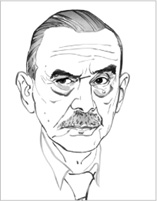

The lesson to be learned from one of the most important writers and best-known Nobel Prize laureates is about a virtue that attracts far too little attention in connection with achievement: discipline.
Thomas Mann (1875–1955) was extremely disciplined, and surely no manager could help but wonder at the results the author achieved through his systematic approach to work. Mann worked on his current novel every day from nine in the morning to noon. If things were going well, during that time he managed to produce between one and one-and-a-half pages. He did this always, wherever he happened to be. When England and France declared war on Germany on September 3, 1939, Mann was traveling through Sweden, and his diary entry for that day states: “I’m writing my page, as usual.”1 In 1941, when he moved from Princeton to California, the furniture removal company packed up the contents of his apartment while he wrote his customary page. This way he produced 400 pages in the course of a year, enabling him to complete a monumental novel every three years.
Remarkably, Mann’s very first novel, Buddenbrooks, subtitled Decline of a Family, published in 1901, made him world famous. The psychological novellas Tonio Kröger (1903) and Death in Venice (1912) were also tremendously successful. Mann spent no less than 11 years working on his masterpiece The Magic Mountain, which was published in 1924. In 1929, Mann was finally, somewhat belatedly, awarded the Nobel Prize for Literature for Buddenbrooks.
Of course you cannot learn how to write like a Nobel Prize laureate, any more than you can learn to paint like Michelangelo or Adolph von Menzel or compose music like Ludwig van Beethoven. However, there are great lessons to learn from their systematic approach: Michelangelo spent seven years working on The Last Judgment, the 19-meter-high fresco on the altar wall of the Sistine Chapel; Menzel, to produce his masterpiece The Iron Rolling Mill, spent weeks of long days in such an environment, busily sketching away; and Beethoven left us more than 5,000 pages of his musical sketchbooks, an impressive testament to the meticulous way he honed his works right down to the finest detail.
However, Thomas Mann was not just a perfectionist in his scrupulous use of time; his discipline also extended to an extremely painstaking approach to content and ideas: nothing was lost! The idea for his novel Doctor Faustus had already come to him in 1901, along with the basic notion of transferring the contents of the Faust legend to a modern setting. More than 40 years later, he took up the idea again, and the novel was duly published in 1947.
The story behind the completion of the picaresque novel Confessions of Felix Krull, Confidence Man is equally remarkable. Thomas Mann started work on it in 1910, but he interrupted it to write his novella Death in Venice. The first part of Felix Krull was published in 1922, the second in 1937, yet he only completed the book between 1951 and 1954. Mann hinted at a sequel to the abruptly ending book in its subtitle Memoirs, Part 1, and a note found among his papers contained a synopsis of four more parts that were left unwritten, because Thomas Mann died a year later, at age 80.
Mann was very much aware of his discipline, describing his most comprehensive work, Joseph and His Brothers, the day he finished it as “a monument to tenacity.”2 He wrote the tetralogy between 1926 and 1942.
Even for a genius it only seems easy to achieve greatness. As Schiller once wrote to Goethe, “If only the critics, ever ready to judge, and frivolous dilettantes knew what it takes to produce a decent work.”3
I would like to wrap up this chapter by sharing a personal anecdote with you. After one of my presentations on management, an elderly gentleman approached me and said, “You spoke about discipline. I liked that. It may be the most underestimated of success factors.” I later found out that the man in question started out as an entrepreneur employing around a dozen people some 50 years ago, whereas today his company is active worldwide, employing many, many thousands of people—a success he largely attributes to discipline.
![]() How important to you is discipline?
How important to you is discipline?
![]() What exactly can you do over the next six months to gain experience in this domain?
What exactly can you do over the next six months to gain experience in this domain?